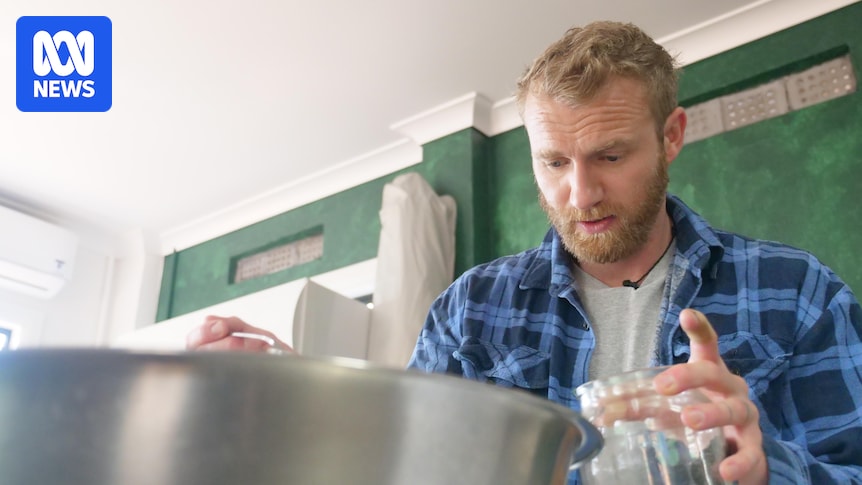Spent beer grains, ugly fruit and old coffee beans might seem, at first glance, like odd things to throw into a morning treat.
But in Western Australia’s South West, a German chef has made using ingredients — that would otherwise go to waste — a cornerstone of his business.
“The name [of my shop] is German for ‘fallen fruit’, and that just encompasses the whole concept of the business,” Wilhelm Grothum said.
“I guess you could call this my waste HQ. I am all about minimising food waste.”
The chef cooks with ingredients supplied from local farmers. (ABC South West WA: Kimberley Putland)
The chef opened his store, Fallobst, at Bridgetown, 260 kilometres south of Perth, in 2023, with the idea that the food would incorporate elements of otherwise-unwanted ingredients.
“It ranges from tomatoes in summer, at the moment we are using lots of citrus like oranges and lemons,” Mr Grothum said.
Although he is best known for his sourdough breads, the chef said he experimented with a variety of “ugly” produce.
“I sometimes use spent beer grains from the local cidery, or coffee grounds — sometimes I cook chocolate and coffee-ground cookies,” he said.
The menu is constantly changed based on seasonality. (ABC South West WA: Kate Forrester)
Childhood influence
Having moved from Germany to Australia nearly two decades ago, Mr Grothum said his interest in tackling food waste started in childhood.
“I moved here in 2006, but since then I have travelled the world, working on different farms,” he said.
“You can see [food waste] is a global problem.
Wilhelm Grothum experiments tirelessly before anything makes it onto his shelves. (ABC South West WA: Kate Forrester)
“I always remember when I was growing up in East Germany, spending time with my grandparents out in their fields, helping them grow potatoes, feeding the livestock. I think it was then that I became aware of food waste.
“It was a period when people thought twice about throwing things out, back then there was a value on that because people didn’t have a lot.”
Wilhelm Grothum says he grew up with an agricultural background in Germany. (ABC South West WA: Madigan Landry)
The chef said he hoped to see the food industry take greater action in addressing waste.
“There needs to be more skills provided to the food industry in general, there needs to be more happening when it comes to food waste,” Mr Grothum said.
“That’s why I am trying to give a bit of an insight into what is possible.”
Shared solutions
Manjimup passionfruit grower Mitchell East supplied some of his surplus produce to the Bridgetown bakery.
“He has made passionfruit vinegar, passionfruit-infused salt — it’s a good collaboration between like-minded people,” Mr East said.
Mitchell East has sent some of his waste to the German baker in the past. (ABC South West: Madigan Landry)
Although Mr East has a processing facility on his farm, the grower said there were parts of the passionfruit he could not use, so having another outlet for the excess was a valuable alternative.
“The skin can’t be used by us, except for animal feed, so Will was able to take some of that from us,” Mr East said.
Mitchell East makes sodas using second-grade passionfruit. (ABC South West: Madigan Landry)
“We also remove a portion of the seed when we make our cordials and sodas, and at the moment we don’t have a use for [the seeds], so Will can ferment it, he can dry it.
“All these different things he can do on a small scale, but still re-harness that lost energy.”
Mitchell East’s passionfruit waste has been given a second life by Fallobst’s owner. (ABC South West WA: Madigan Landry)
Mr East said he saw a great opportunity in the waste space in South West WA.
“As a farmer, you are always going to have waste; there is nothing you can do about it,” he said.
“But if there are people who are keen to tackle food waste, there are definitely opportunities here.”

